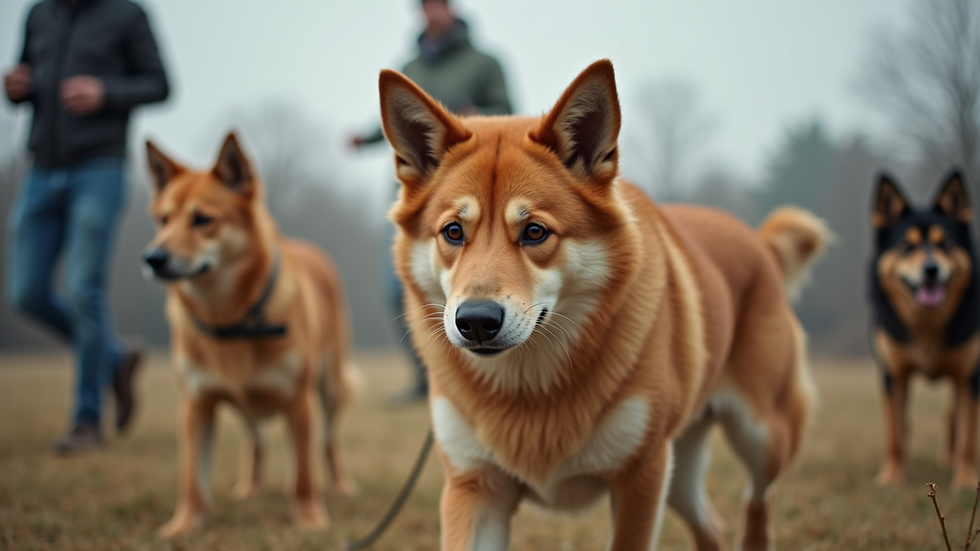Why Group Classes Are Great for Puppies
- Elton Hill
- Jun 16
- 4 min read
Puppies are incredibly energetic and curious little beings. When you bring a puppy into your home, you are not just gaining a companion; you are also entering a new world of training and socialization challenges. One effective way to meet these challenges is through group classes. In this post, we will explore why puppy classes are an excellent choice for both you and your furry friend.
Benefits of Puppy Classes
Group classes provide an interactive and stimulating environment for puppies. They offer socialization opportunities, essential for a well-rounded dog. Puppies learn to interact appropriately with other dogs and understand boundaries, which is crucial for their development.

One notable benefit of puppy classes is the opportunity to train in a supervised setting. Professional trainers can guide you on how to correct unwanted behaviors in real-time. According to a study by the American Kennel Club, puppies that attend classes are less likely to develop behavioral issues later in life. This early guidance can save you significant time and frustration.
Learning Basic Commands
During puppy classes, trainers often focus on teaching basic commands like sit, stay, and come. These commands are not only essential for everyday management but also serve as a foundation for more advanced training later.
The structure of group classes typically involves a series of exercises designed to reinforce these commands while maintaining the puppies' interest. Puppies learn faster in a dynamic environment with distractions, which helps them generalize the commands to various situations.

Moreover, social interaction during training can reinforce positive behaviors. For instance, when a puppy successfully performs a command, praise from both the owner and the trainer enhances the learning experience. This reinforcement can lead to quicker and more consistent responses.
Socialization Opportunities
Puppies are naturally curious, and exposing them to different environments, people, and animals is crucial for their development. Group classes offer a unique opportunity for socialization in a controlled and safe environment.
Puppies learn to understand various social cues, which helps them navigate relationships in the future. According to the American Veterinary Society of Animal Behavior, the critical socialization window for puppies is from 3 to 14 weeks of age. Group classes can play a significant role during this period.

Furthermore, socializing in a group can reduce anxiety and fearfulness in future situations. A well-socialized puppy is less likely to fear unfamiliar dogs or people, leading to a more confident and happy adult dog. These experiences are beneficial not just for the puppies but also for their owners, easing long-term concerns related to behavioral issues.
Tips for Choosing a Good Puppy Class
Choosing the right puppy class can significantly affect your experience. Here are some practical tips to help you find the best fit:
Look for Qualified Instructors: Ensure the instructors have experience and certifications. They should use positive reinforcement techniques as their primary method of training.
Check Class Size: Smaller class sizes are often more effective. A good ratio of trainers to puppies allows for more personalized attention.
Observe a Class: If possible, watch a class before enrolling. Pay attention to how the trainer interacts with the puppies and their owners.
Ask About Curriculum: Inquire about what commands and skills will be taught. A well-rounded curriculum should address basic manners and socialization skills.
Get Recommendations: Seek recommendations from friends or local pet stores. They can point you toward reputable training facilities.
Long-Term Benefits
Puppy classes contribute to long-term benefits. Early training sets the foundation for a well-behaved adult dog. According to the ASPCA, trained dogs are less likely to be surrendered to shelters due to behavioral issues, which is a significant concern for many pet owners.
Moreover, attending puppy classes fosters a bond between you and your puppy. As you engage in training together, you will build trust and understanding. This bond is crucial for a harmonious relationship throughout your dog’s life.
The Role of Consistency
Consistency is key when it comes to training. Puppy classes instill the importance of maintaining practice at home. Trainers often provide homework, which encourages owners to reinforce the skills learned during class. This consistency helps puppies understand that commands apply not just in class but in everyday life as well.
Engaging in regular practice also strengthens your dog’s learning curve. The more consistent you and your puppy are with commands, the more natural the responses become. Incorporating training into daily routines makes it enjoyable for both of you.

Conclusion: Embrace the Journey
Participating in puppy classes is not just about training commands; it's about embracing the journey of nurturing a healthy and happy dog. By enrolling your puppy in classes, you're giving them the tools they need to thrive socially and psychologically.
The skills learned in puppy training classes will benefit you both in the long run. The laughter, joy, and occasional mishaps will create lasting memories. So, invest time in finding the right class for your puppy and immerse yourself in this rewarding experience. You will be glad you did!
For more details on puppy training classes, check out this useful link to help set you on the right track.




Comments